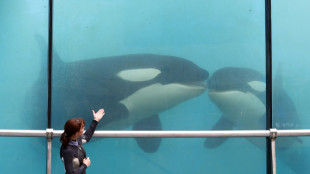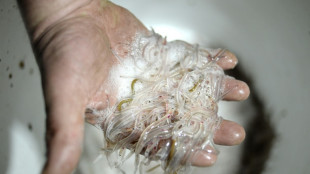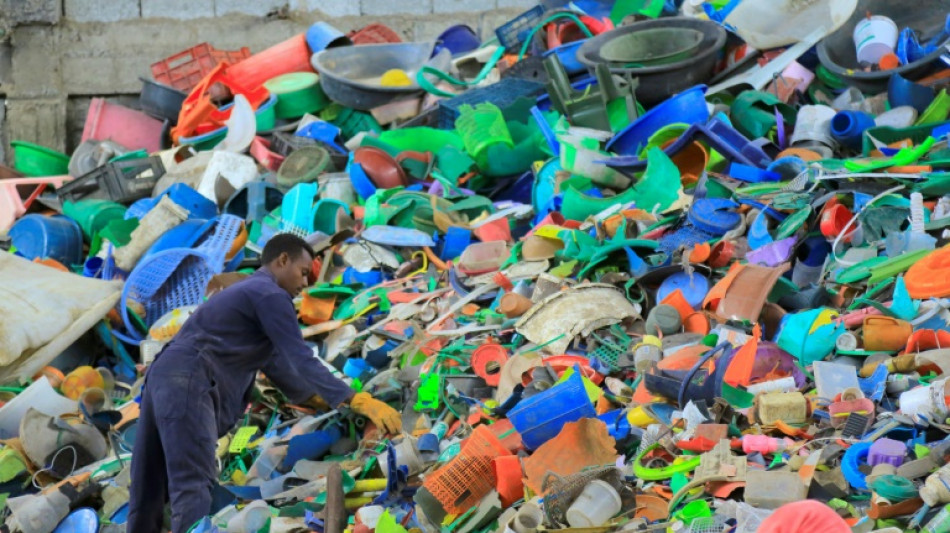
-
 Junta chief frontrunner as Gabon holds first election since 2023 coup
Junta chief frontrunner as Gabon holds first election since 2023 coup
-
Iran delegation in Oman for high-stakes nuclear talks with US
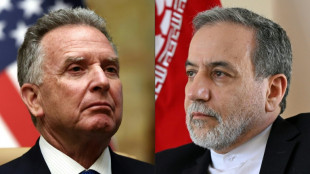
-
 Australia beat Colombia to end BJK Cup bid on winning note
Australia beat Colombia to end BJK Cup bid on winning note
-
German refinery's plight prompts calls for return of Russian oil

-
 Trump carves up world and international order with it
Trump carves up world and international order with it
-
Paris theatre soul-searching after allegations of sexual abuse

-
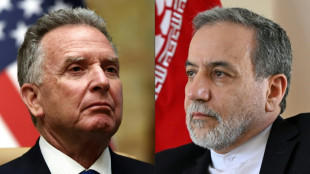 US, Iran to hold high-stakes nuclear talks
US, Iran to hold high-stakes nuclear talks
-
Frustrated families await news days after 222 killed in Dominican club disaster
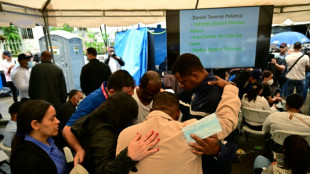
-
 Jokic triple double as Denver fight back for big win
Jokic triple double as Denver fight back for big win
-
Trump envoy suggests allied zones of control in Ukraine
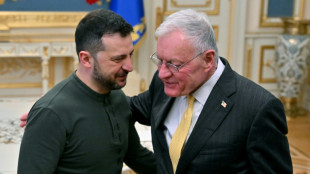
-
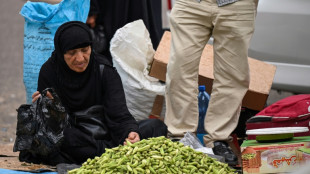 Iraqi markets a haven for pedlars escaping Iran's economic woes
Iraqi markets a haven for pedlars escaping Iran's economic woes
-
Chinese manufacturers in fighting spirits despite scrapped US orders

-
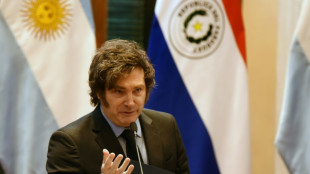 Argentina receives $42 bn from international financial institutions
Argentina receives $42 bn from international financial institutions
-
Menendez brothers' resentencing can go ahead: LA judge rules
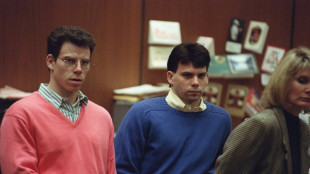
-
 'Hard on the body': Canadian troops train for Arctic defense
'Hard on the body': Canadian troops train for Arctic defense
-
Trump, 78, says feels in 'very good shape' after annual checkup

-
 McKellar 'very, very proud' after 'Tahs tame rampant Chiefs
McKellar 'very, very proud' after 'Tahs tame rampant Chiefs
-
Man executed by firing squad in South Carolina

-
 Defending champ Scheffler three back after tough day at Augusta
Defending champ Scheffler three back after tough day at Augusta
-
Ballester apologizes to Augusta National for relief in Rae's Creek

-
 Scorching Coachella kicks off as Lady Gaga set to helm main stage
Scorching Coachella kicks off as Lady Gaga set to helm main stage
-
McIlroy, DeChambeau charge but Rose clings to Masters lead

-
 Langer misses cut to bring 41st and final Masters appearance to a close
Langer misses cut to bring 41st and final Masters appearance to a close
-
Ecuador presidential hopefuls make last pitch to voters

-
 Rose knocking on the door of a major again at the Masters
Rose knocking on the door of a major again at the Masters
-
DeChambeau finding right balance at Augusta National

-
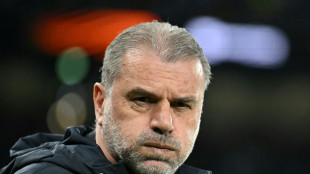 Spurs leaker not a player says Postecoglou
Spurs leaker not a player says Postecoglou
-
All Black Barrett helps Leinster into Champions Cup semis

-
 Round-two rebound: Resilient McIlroy right back in the Masters hunt
Round-two rebound: Resilient McIlroy right back in the Masters hunt
-
Asset flight challenges US safe haven status

-
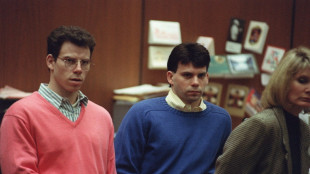 Menendez brothers appear in LA court for resentencing hearing
Menendez brothers appear in LA court for resentencing hearing
-
McIlroy, DeChambeau charge as Rose clings to Masters lead

-
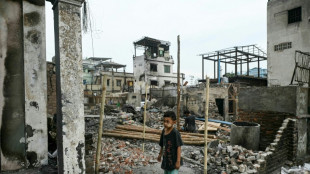 UN seeks $275 million in aid for Myanmar quake survivors
UN seeks $275 million in aid for Myanmar quake survivors
-
Frustrated families await news days after 221 killed in Dominican club disaster
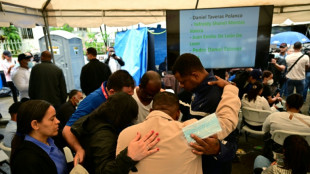
-
 Trump wants to halt climate research by key agency: reports
Trump wants to halt climate research by key agency: reports
-
Fed official says 'absolutely' ready to intervene in financial markets

-
 Slumping Homa happy to be headed into weekend at the Masters
Slumping Homa happy to be headed into weekend at the Masters
-
Morbidelli fastest ahead of cagey MotoGP title rivals in Qatar practise

-
 Musetti stuns Monte Carlo Masters champion Tsitsipas to reach semis
Musetti stuns Monte Carlo Masters champion Tsitsipas to reach semis
-
Abuse scandal returns to haunt the flying 'butterflies' of Italian gymnastics

-
 Trump defends policy after China hits US with 125% tariffs
Trump defends policy after China hits US with 125% tariffs
-
Frustrated families await news days after Dominican club disaster
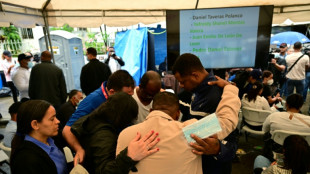
-
 McLarens dominate Bahrain practice, Verstappen rues 'too slow' Red Bull
McLarens dominate Bahrain practice, Verstappen rues 'too slow' Red Bull
-
Eight birdies rescue Masters rookie McCarty after horror start
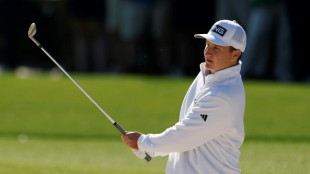
-
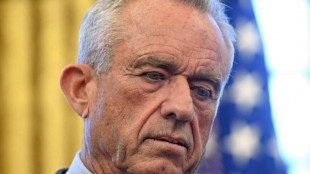 RFK Jr's autism 'epidemic' study raises anti-vaxx fears
RFK Jr's autism 'epidemic' study raises anti-vaxx fears
-
Trump -- oldest elected US president -- undergoes physical

-
 Rose clings to Masters lead as McIlroy, DeChambeau charge
Rose clings to Masters lead as McIlroy, DeChambeau charge
-
Brazil's Bolsonaro hospitalized with abdominal pain, 'stable'

-
 Canada, US to start trade talks in May: Carney
Canada, US to start trade talks in May: Carney
-
Six arrested for murder of notorious Inter Milan ultra


Seeking an 'angel': African startups face funding challenge
Kubik is proud of its pioneering, climate-friendly technology that recycles one of the world's environmental curses -- plastic waste -- into construction blocks.
But for the award-winning Ethiopian startup to achieve liftoff has been no easy task. It has had to fight tooth and nail to raise funds, says its youthful boss.
Kubik takes in bundles of discarded plastic and sorts them into piles. Selected plastics are mixed, melted and combined with additives, and then moulded into the desired shape.
The result: black beams and interlocking blocks which today are being assembled in a pilot project -- the building of a daycare centre in the capital Addis Ababa.
The site has no cranes or cement mixer, just a concrete floor on which four workers make a wall by fitting the blocks together like Lego, tapping them with a mallet to ensure a good fit.
There's no glue or cement.
The beams, bolted together on all four sides of the walls, hold the structure up.
"The idea’s for it to be super simple," said overseer Hayat Hassen Bedane, a 34-year-old structural engineer.
"You have a manual, and the whole point is to get it done with inexperienced workers, obviously under supervision.
"You can... build 50 square metres (540 square feet) of a building in just five days, so that's super fast compared to other forms of construction," she said.
"We’ve done tests, tension-stress tests and compressive tests, so it’s durable and very strong."
Speed and the smart use of unwanted plastic aren't the only benefits.
The recycling generates just a fifth of the carbon from cement making. If Kubik's plant processes 45 tonnes of ditched plastic each day, that's 100,000 tonnes of carbon dioxide (CO2) averted each year, the company says.
There's a trickledown socially, too, boosting the country's many informal waste pickers, many of whom are women.
- Funding challenge -
But Kubik's CEO, Kidus Asfaw, 36, said he battled to get seed money for his company.
He received a lot of knock-backs from wary investors, he says, before catching a break.
He has just completed a round of funding for several million dollars to scale up production -- a success that coincided with the prestigious AfricaTech award for the company, which boosted visibility.
The Ethiopian previously worked for Google, the World Bank and Unicef after studying in the United States.
He then took the plunge to become an entrepreneur, he said.
"There's a really large network that I already had within my professional sphere that I could tap into in the beginning," he told AFP last month in Paris, where he went to pick up the award.
Even so, "having that did not make it any easier" to raise funds.
"I've met over 600 people in two years. Out of those 600 people, about 20 of them have become investors."
Startups in Africa face myriad hurdles, from laws and regulations and lack of infrastructure to a fragmented continental market.
But funding, in a continent that lacks intrepid individual investors to provide support, is a persistent and major headache.
"There are very few 'business angels' in Africa," said Sergio Pimenta, vice president for Africa at the Societe Financiere Internationale (SFI), a private-sector unit of the World Bank that has just launched a $180-million fund to help provide a financing source.
Out of $415 billion in risk capital deployed around the world, just over one percent -- $5.4 billion -- goes to Africa, he said.
And of this sum, 80 percent goes to just four countries: South Africa, Kenya, Nigeria and Egypt.
- 'Bias' -
Henry Mascot, CEO and founder of Nigerian insurance startup Curacel, a fellow winner of the AfricaTech award, said he floundered when he first tried to raise capital a few years ago.
Africa's problem, he said, was that Western investors had a "bias" against the unknown.
"They invest in familiarity. They invest with the guy who they play golf with, or the guy who they have a drink with every month.
"So how do I become that guy? Unless a lot of these investors are starting to spend time on the continent, it will be difficult. It's just about familiarity, Africa needs to be demystified, because right now it's a mystery."
Fabrice Aime Takoumbo, a Cameroonian entrepreneur who cofounded Cinaf, a streaming platform with only African content, said that non-African investors were often deterred by tales of fraud or corruption.
Without timely funding, many African startups withered, he warned.
"You start off with great ideas... (which) fall away as time passes and you realise that you don't have the means," he said.
"Some people simply stop."
J.Williams--AMWN

